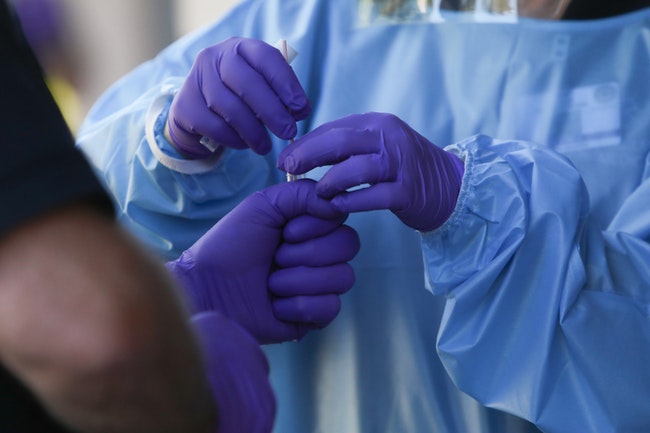 A Covid-19 test swab is packaged up to be tested during a free drive-through testing clinic at Woodburn Ambulance Service on Tuesday, August 25. (Amanda Loman/Salem Reporter)
A Covid-19 test swab is packaged up to be tested during a free drive-through testing clinic at Woodburn Ambulance Service on Tuesday, August 25. (Amanda Loman/Salem Reporter)
Oregon will soon receive tens of thousands of additional coronavirus tests weekly from the federal government, allowing the state to test far more people and respond quickly to new outbreaks.
But Gov. Kate Brown and state health officials cautioned more testing alone would not be enough to reopen Oregon’s schools and said health precautions like wearing a mask and avoiding large gatherings remain essential.
“We cannot test our way out of this pandemic,” Brown said in a Tuesday news conference. “We all have a responsibility to stay the course to save lives.”
The influx of new tests, about 60,000 to 80,000 per week, will double Oregon’s testing capacity, Oregon Health Authority Director Pat Allen said, and allow health authorities to more quickly trace the virus’ spread.
Since February, Oregon has recorded 35,340 people with Covid, 581 of whom have died.
Allen said tests would be prioritized for counties and long-term care facilities affected by wildfires, then sent to other health providers across the state.
Tests will also go to schools and health centers for colleges and universities across the state, Allen said.
With more tests available, the health authority is now recommending anyone in close contact with a person known or suspected to have Covid get tested. Previously guidelines recommended testing only for close contacts with symptoms of illness.
The tests are rapid, with results in about 15 minutes, but that speed comes with a trade-off: they’re more likely to return a false negative than other tests where patients wait several days to get results from a lab. That’s because rapid tests work by identifying a specific protein, called an antigen, on the virus, rather than looking for a section of the virus’ genetic material.
Health officials said Tuesday that false positives are rare, but a negative test doesn’t necessarily mean a person doesn’t have Covid.
“If you get a negative test result, please don’t change your behavior. You should still wear a mask, physically distance, wash your hands, avoid gatherings and be cautious when visiting vulnerable friends and family members,” said Dr. Melissa Sutton, a senior health adviser for OHA.
Brown and health authorities also suggested they may soon relax the state’s measures that generally bar the opening of schools. With exceptions for small schools, Oregon districts currently can’t resume classes until the state drives its rate of positive tests down. The benchmark now is no more than 5% of those getting tested over a three-week period can be found infected. The average state rate last week was 6.4% – but many counties, including Marion, are posting higher rates.
Brown and Allen cautioned that their review of data and the expansion of testing doesn’t mean all Oregon kids will be back in a classroom soon. Brown said social events like birthday parties, weddings and family gatherings are continuing to drive the spread of the virus and said avoiding those events remains vital to getting kids back to school.
“If we want to get our infection rates down and we want to get our kids back in school we all have to make sacrifices,” she said.
That ambition has been thwarted in recent weeks. The daily number of Oregonians testing as infected had been declining through the summer but has been edging back up since late August, Allen said.
“Covid is a stubborn enemy,” he said.
Brown said President Trump’s bout with Covid and his subsequent remarks that people shouldn’t fear the virus haven’t been helpful.
“Flouting our safety protocols is a recipe for disaster,” the governor said. “When we have an administration that is flouting scientific data and CDC guidelines, it is really challenging for Americans to inform themselves.”
Brown said Trump’s upbeat assessment of Covid wouldn’t trigger any change in Oregon’s policy in handling the pandemic. She said Oregonians generally continue to comply with steps such as wearing masks and washing hands.
“They understand common sense,” Brown said.
SUPPORT ESSENTIAL REPORTING FOR SALEM – A subscription starts at $5 a month for around-the-clock access to stories and email alerts sent directly to you. Your support matters. Go HERE.
Contact reporter Rachel Alexander: [email protected] or 503-575-1241.

Rachel Alexander is Salem Reporter’s managing editor. She joined Salem Reporter when it was founded in 2018 and covers city news, education, nonprofits and a little bit of everything else. She’s been a journalist in Oregon and Washington for a decade. Outside of work, she’s a skater and board member with Salem’s Cherry City Roller Derby and can often be found with her nose buried in a book.









